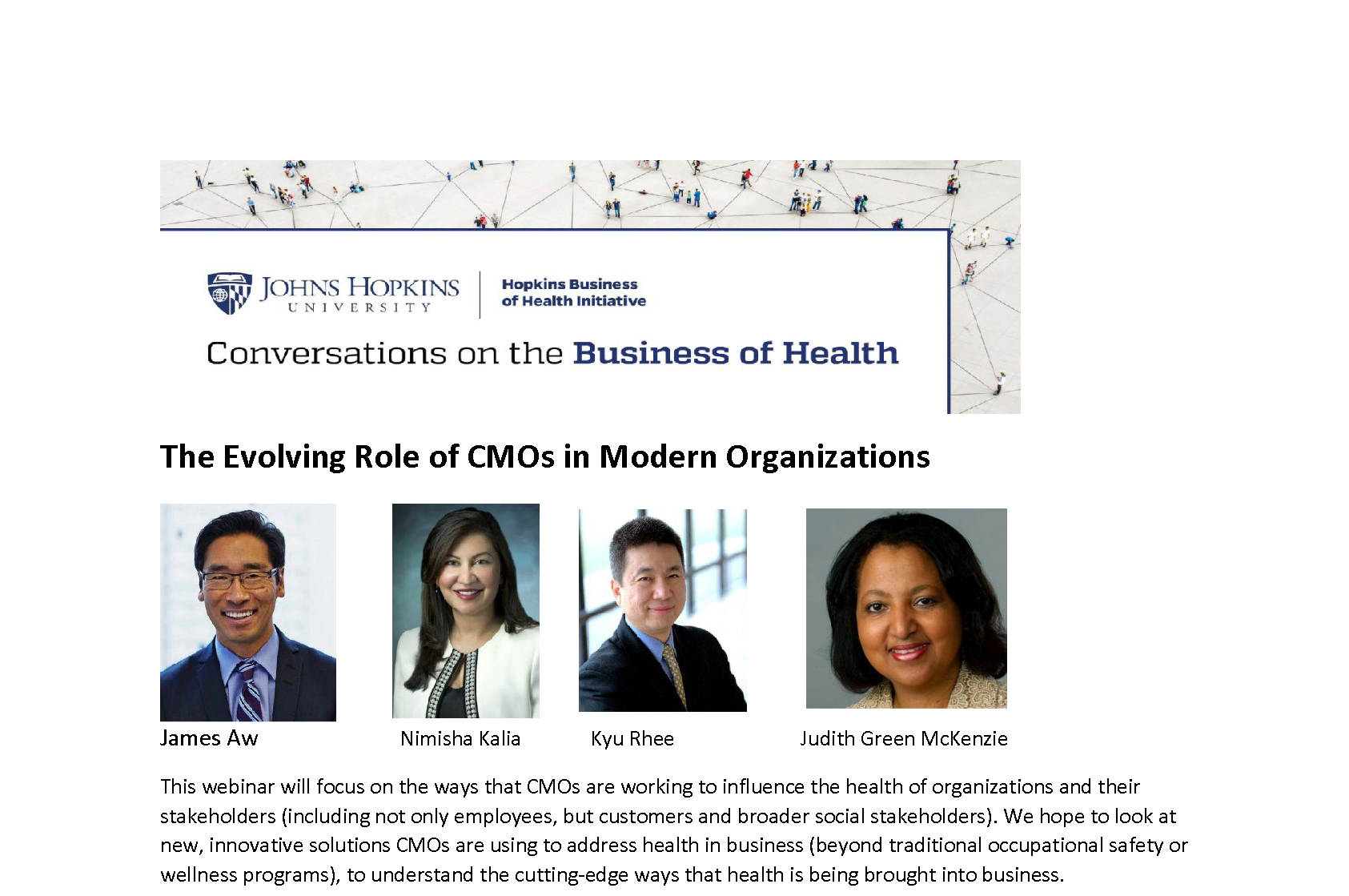The Hopkins Business of Health Initiative hosts “Conversations on the Business of Health,” a series of one-hour webinars that engage leaders of business and academia on the cutting edge of improving American health care. Moderated by faculty members and jointly hosted by the Bloomberg School of Public Health, the Carey Business School, the School of Nursing, and the School of Medicine, the series is open to all. For upcoming conversations, see our events page

As Medicare Advantage plans expand their supplemental benefits to include caregiver support, this session will examine the emerging business models, implementation challenges, and the potential for meaningful impact on families navigating complex care needs.
| Read More...



Expert panelists: Jim Rebitzer, PhD, and Bob Rebitzer.
This was an enlightening discussion with the authors of "Why Not Better and Cheaper?" We explored the unique challenges of healthcare innovation in the US and discussed why there's a lack of incentives for cost-reducing innovations and the ease of profiting from low-value innovations.
|
Expert Panelists: Fred Barrett, PhD, Melissa Lavasani, Lia Mix, LMFT. To understand the burgeoning business landscape surrounding this innovative therapy, the Hopkins Business of Health Initiative, in partnership with the Center for Mental Health and Addiction Policy, recently convened a panel of national experts to discuss the cutting-edge convergence of psychedelics, business, and policy.
|

Expert Panelists: Danielle Drory, JH, PhD, Stephanie Quinn, and Barak Richman, JD, PhD. Despite their prevalence, the issue of noncompete agreements stands at a watershed moment as state and federal policy take aim at their anticompetitive effects on worker mobility and wages, raising an urgent question: how might changes in the use of noncompete agreements hinder or improve the delivery of healthcare?
| Learn more here...

Expert panelists: Avi Goldfarb, PhD, and Natalia Levina, PhD. For many years, there has been a collective excitement about using artificial intelligence in healthcare delivery. Still, AI technology is often talked about as if it is science fiction and the future of healthcare. Despite the FDA's approval of more than 500 medical AI systems by July 2022, many experts question if AI is a reality in the medical arena, or if it remains far in the future.
| Read more...
Past Conversations:
Understanding the Nursing Crisis, From Every Angle
Nursing faces critical issues, resulting in the current nursing crisis. How do we understand the nuances impacting the profession, build mutual understanding, and find solutions? The panelists represent varied perspectives across the nursing workforce. They will address the impacts of the shortage, strategies for addressing it, and the role of policy in solutions. Read more here...
Digital Tools Are Putting Effective Behavioral Health Treatments in Patients' Pockets
It’s clear that changes in telehealth policy, mobile technology development, and consumer demand have fundamentally reshaped mental health treatment and substance use care in the US and around the world. What does this mean for people’s outcomes, specifically behavioral health care access, quality, and cost? Read more here...
AI in Healthcare Is Here, But Uptake Is Slow
For many years, there has been a collective excitement about using artificial intelligence in healthcare delivery. Still, AI technology is often talked about as if it is science fiction and the future of healthcare. Despite the FDA's approval of more than 500 medical AI systems by July 2022, many experts question if AI is a reality in the medical arena, or if it remains far in the future—and how to overcome the obstacles to adopting the new technologies? Read more here...
Common Ground? Organizational Objectives and Employee Health
What responsibility do employers have to the health and well-being of their employees? The question is more important than ever since the COVID-19 pandemic and with more employees working from home. Read more here...
How the Experts Design Employer-Led Health Initiatives
The main asset of a business is its people, without whom organizations could not function. As such, employers are naturally motivated to invest in their workers. But how should they go about improving the health of employees while also improving the company’s bottom line? Read more here...
Whose Business Is Health? Corporate Social Responsibility and the Health of Americans
Do companies have a responsibility for the health consequences of their products? Should those consequences drive how a company designs its product or service to be used by customers? What are the tradeoffs? Read more here...
Improving the Health of Americans Will Require Corporate Collaboration
As the health of Americans gets worse, with chronic disease and physical and mental illnesses on the rise, do corporations have a role to play in addressing the health crisis? Given the massive influence of their products and services on community well-being, there may be no alternative. Read more here...
Delivering High Value Employee Health Care: How Businesses Can Do Better
About half of Americans get their health insurance through their employer, or a family member’s employer. But the cost is high—and the quality uneven. Employers have a lot of power in the health care market. How can they wield it to improve the value of health care services delivered to their employees and families? This event, kicking off the 2022-‘23 series for the Hopkins Business of Health Initiative, will look at opportunities and challenges now, and in the years ahead. Read the takeaways here...
Incentive to Innovate: Corporate Solutions for America's Broken Health System
Around 150 million Americans rely on employers for access to health care. Can the companies who employ them help foster an affordable system that improves our health and doesn't drive us crazy in the process? Read more here...









